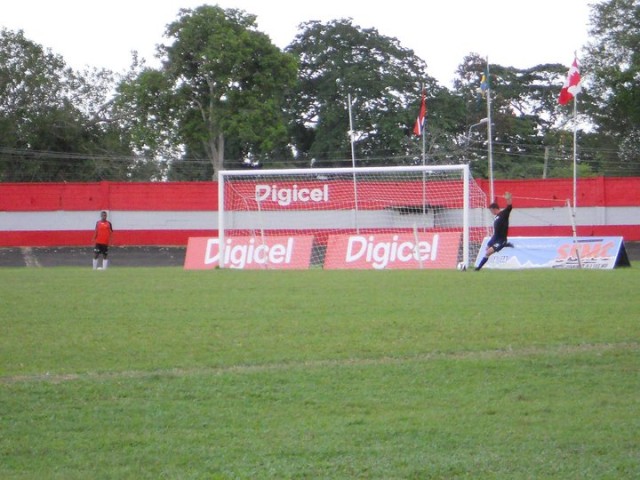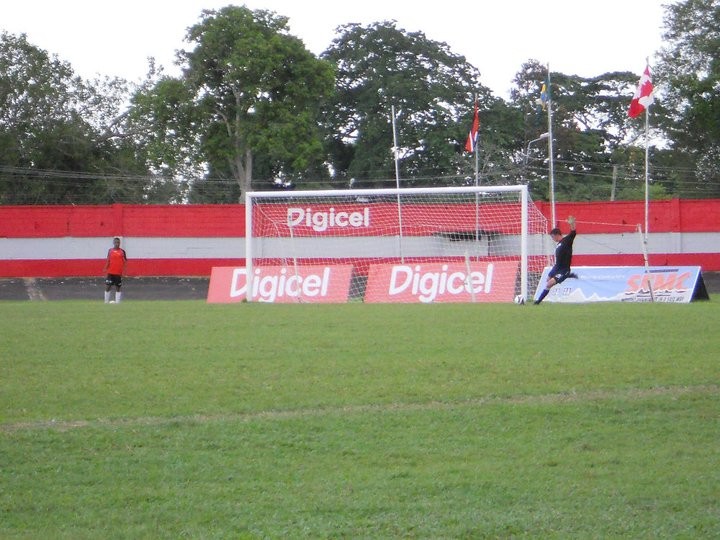HOHENFELS, Germany AcE+'A Soldier with Company A, 2nd Military Intelligence Battalion, thrives on competition so much that he traveled more than 15,000 miles across three continents to represent Hohenfels and the U.S. Army in two world-class soccer tournaments.
2nd Lt. Andrew J. Glubzinski earned a place on the Army team for the Armed Forces Men's Soccer Championships, and his performance in that tournament not only helped the Army grab the gold, but also led to his selection for the All Armed Forces team to represent the United States in the 2010 International Military Sports Council (CISM) Continental Men's Soccer Championship tournament.
"It was a great opportunity to spend time with soldiers from all over the Army, and ultimately from all the different services," Glubzinski said. "Interacting with a whole gamut of folks you just don't get to be around."
Joining the Army team involved applications, commanders' recommendations, and an impressive resume of past soccer achievements. "I played four years at West Point," said Glubzinski.
Recruited from Vardar III, one of the largest soccer clubs in Michigan, he started for three years, earning his way to team captain by his senior year. Out of the 130 applicants, 30 qualified to attend a trial camp. From those, 18 were selected for the Army team.
Glubzinski appreciated interacting with other officers from around the globe. "We had a guy from Japan, a guy from Korea, couple of us from Germany, couple guys from Hawaii - geographically, the whole Army brought into this camp and got together."
The team trained at Fort Eustis, Va., for almost a month, before hitting the field in Florida for the Armed Forces Championship. They started off the tournament with a victory against the Navy, scoring the game's only goal in the last 20 minutes. But their next two games did not go as well.
"At the end of the group stage of the tournament, out of all four services, we were in fourth place," said Glubzinski.
But the team rallied in the semi-finals defeating the Air Force 1-0. In the final battle against the Navy, the score remained 0-0 throughout regulation play.
"There was a lot of tension going into overtime," said Glubzinski. "They scored on us about five minutes into the first overtime, and we scored about a minute and a half later."
With the score still tied at the end of the first overtime, the teams engaged in a shootout where Glubzinski's goal keeping skills helped earn the Army the gold medal in a 4-3 victory.
Glubzinski's skill earned him the opportunity to represent the United States in the CISM Continental Men's Soccer Championship. "They picked a roster of 18 guys from all the services," Glubzinski said. "Basically, an all-star team from the tournament."
With only a little more than a week to prepare, the team played a lot of scrimmages, struggling to forge their new force into a cohesive unit.
"The all-star team had a lot of forwards," said Glubzinski. "So, most of our training was just getting used to new positions, learning to work as a team."
The tournament took place in Paramaribo, Suriname, with teams from Brazil, Ecuador, Trinidad and Tobago, Barbados, Suriname, Canada, and the United States.
"We're right by the equator," said Glubzinski, "so it was about 95 degrees with 95 percent humidity every day. It was very interesting circumstances to play soccer in."
Located on the north east coast of South America, Suriname is the smallest independent country on the continent.
"So, there weren't a lot of flights coming in," said Glubzinski "Half our team didn't even make it the first day. They got there at like four in the morning, and we're playing Brazil that night."
Brazil shut out the United States with a 2-0 victory, going on to win the tournament undefeated.
"That's one of the best teams I've ever played against," Glubzinski said, adding, "but we gave them quite a game."
The U.S. team lost their next match against Barbados 3-1, then scored a 4-3 victory over Ecuador, finishing the tournament in 5th place.
"That's actually closer than it sounds," Glubzinski said. The United States, Ecuador, and Barbados all finished the group games with a 1-2 record. "If we'd scored one more goal we'd have gone on to the semi-finals," Glubzinski explained.
As the second largest sporting organization in the world and comprised of the armed forces of 133 countries, CISM's mission is to contribute to world peace by bringing the world's armed forces together with friendly competition through sports.
"We had a great time interacting with the different teams," Glubzinski said, adding that many members from the opposing countries swapped T-shirts and souvenirs.
"They're very good athletes," said Glubzinski. "They take a lot of pride in their soccer, so for us to be able to go in there and compete gave us an opportunity to build respect for each other on the soccer field."
"It was a very, very competitive atmosphere," said Glubzinski.
But that's exactly what he likes about soccer, and why he thinks sports play an important part in Army readiness.
"Competition fuses teamwork and cohesiveness better than anything else," he said. "It brings the best out of teams and brings good teams together."
And like any good team member, Glubzinski is quick to share the spotlight with others.
"I have a lot of teammates here that have given me a lot of support," he said. "I'm very grateful to the Soldiers and leaders here who made extra sacrifices for me to be able to go." He added, "Ultimately it allowed me to represent the Army, the garrison, and our unit in particular."
Glubzinski plans to donate his team jersey and the gold medal from the Armed Forces game to his company, so it will remain in the trophy case long after he's gone. "I'm pretty excited about being able to add that," he said.
"All in all, it was a great experience," he said. "I felt like a professional athlete. I think we had about five days off the whole two months."
"The body's feeling it a little right now," he grinned.


Social Sharing